GROUPS AND TEAM BUILDING
Unit Overview
Read and study the following unit. Answer the questions at the end of the unit based on the information that you have learned from the unit.
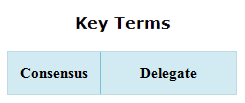
|
Group Decision Making
You as a leader make decisions in the group all the time. The decision making process can be stressful because some members see it as a form of power struggle, some people cannot bear the idea of losing an argument, and some people simply do not like to make decisions.
Decisions are an important part of group life, and you may wonder how your group could improve in this area. All groups, clubs, executive boards, and committees go through a development process. This cycle is most likely repeated every year when new members join.
There are four stages of group development. If you understand these stages, you can combine your energies and reach a group decision.
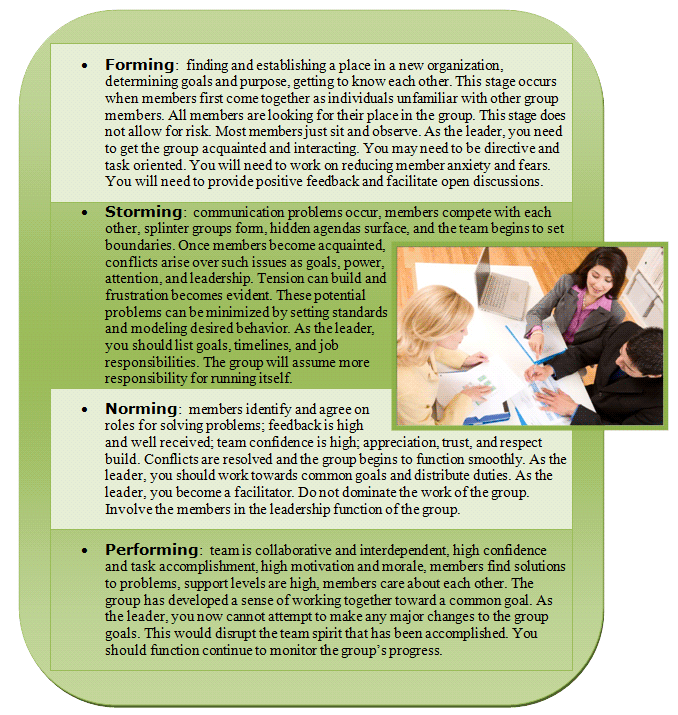 |
The goal is to get your organization to the level of performing. Once your organization is at that level, group decision-making is an easy process. Since members possess essential ingredients for the solution of all disagreements, group decisions should be based on input from all members. Certainly, if there are decisions that only take a few people, it may not be necessary to involve the entire group.
Group Consensus Guidelines
Effectiveness in communication is of paramount importance in the consensus decision-making process. You can enhance group communication by paying attention to the following “DO's and DON'Ts.”
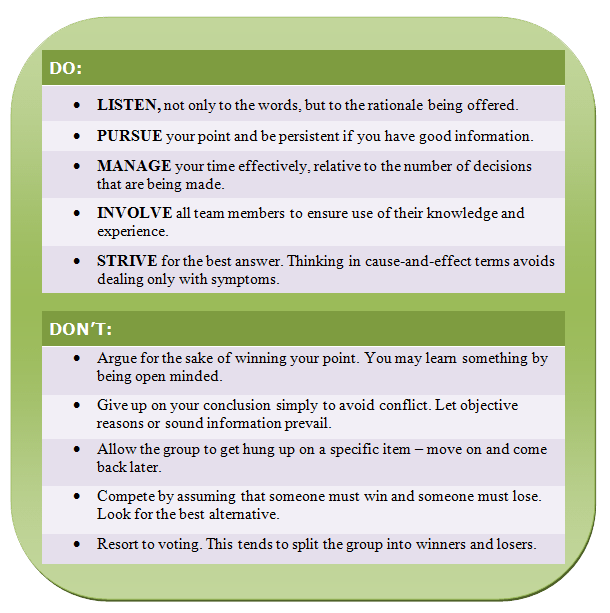 |
The Leader’s Role
This approach to group decision-making places the leader in a particular role where you must cease to contribute, avoid evaluation, and refrain from thinking about solution or group products. Instead you must concentrate on the group process by assuming responsibility for accurate communication between members. The way decisions are made testify to the degree of effectiveness of a group. Here is a list of facts about effective and ineffective groups.
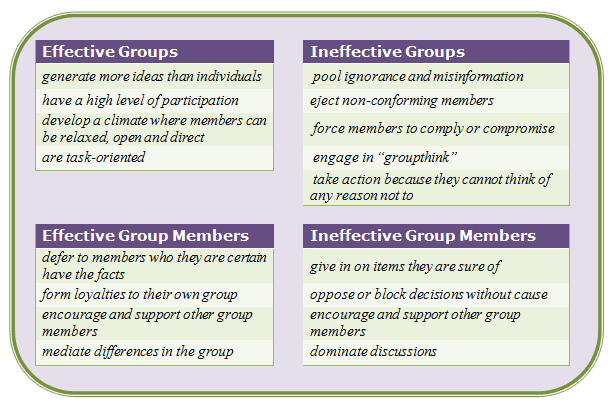
|
|
Building Team Morale, Pride, and Spirit
Troubleshooting: How to Handle Opposition |
Finally, remember all members carry personal history, experience, and perspective to work. The way member respond to you and to others is tied to that personal story. Know this is the case and don't expect everyone to react the same way to your team-building efforts.
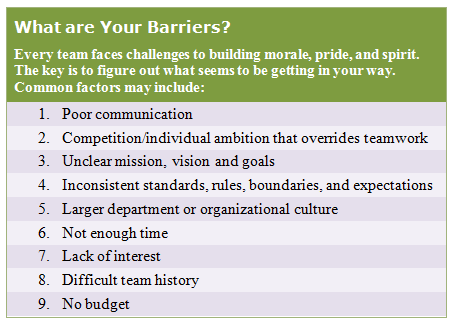
Once you've decided what is limiting you, make a plan to overcome one or two obstacles at a time. With creative thinking, patience and effort, you'll find those barriers starting to fall.
Delegation - Why Is It Difficult?
Any human will tend to repeat behavior that is followed by positive reinforcement and reward. The more successful people are, the more positive reinforcement they tend to get. If you find during a group project in grade five that you have to do all the work for the group to be successful, you are reinforced when all of your hard work on the project is recognized with a good mark. This behavior is further reinforced with each time that you are successful at doing all of the group's work. 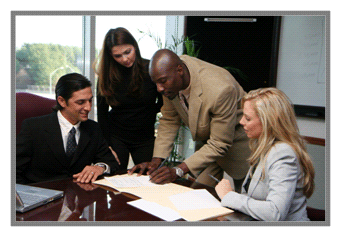 This means you will develop a great fear of letting other people do some of the work because if you change your behavior these good results may disappear. In fact, you can be convinced to let go of control at least once; however, if the group is not successful that time, your original behavior is doubly reinforced.
This means you will develop a great fear of letting other people do some of the work because if you change your behavior these good results may disappear. In fact, you can be convinced to let go of control at least once; however, if the group is not successful that time, your original behavior is doubly reinforced.
Don't expect leaders to like delegating. Most of them have spent many years learning through reinforcement that they do the best job and that others usually fail them when asked to help. It takes a while for both sides to learn what their job really is. Leaders must trust that the followers will complete the tasks assigned, and the followers must believe that they will be allowed to complete the job on their own. Many followers have learned that if they falter, the leader will take over for them. This is reinforcement for a successful follower. Both leaders and followers must find a new paradigm of positive reinforcement for activity groups to be successful.
Many leaders find it difficult to delegate. There are a number of reasons for this including: preferring to do the job themselves and see it is done right; not wanting to impose large responsibilities on other members of the group; some of the spotlight is moved away from the leader. While doing it all yourself may get the job done, it can create apathy among non-involved members of the group.
Sometimes, leaders make the mistake of delegating only menial work, while keeping appealing tasks for themselves. This can give members a feeling of being used, rather than being important. The following are some simple guidelines to determine delegating responsibilities.
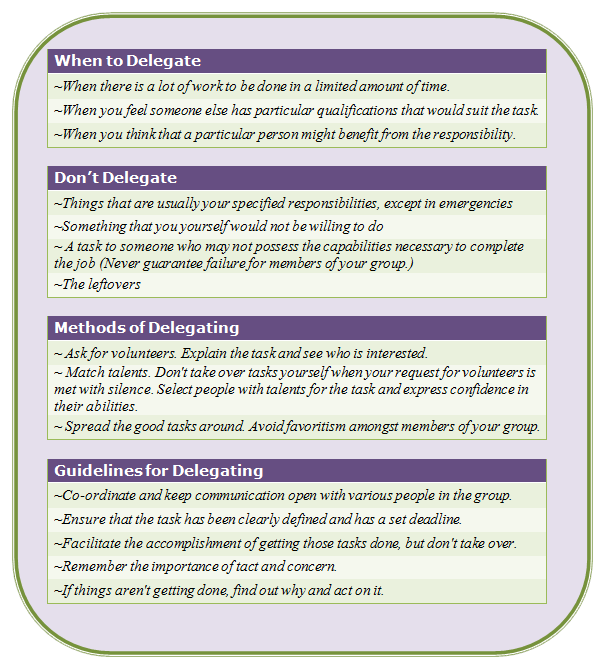 |
Obstacles to Delegation...and Solutions PDF
Why Group Members may not Accept Delegation
1. They find it easier to ask the person in charge than to make a decision by themselves.
2. They do not understand their own authority level; therefore, they are indecisive.
3. They fear criticism of their mistakes and may lack self-confidence.
4. They lack resources and necessary information to do a job.
|
Creating Effective Teams
Teams function better in a culture that |
As the leader of the team, you need understand group development. You need to be patient. Take responsibility for what is happening. Be supportive of the other members. Make sure tasks are completed in a timely manner.
Highly performing team members must pay attention to the following to ensure productivity from their team.
Goals Roles
Leadership
The team then makes changes for improvement. Discussion, Decision Making, and Planning Implementation and Evaluation Norms and Individual Differences
Structure Cooperation and Conflict Management |
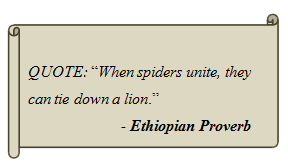
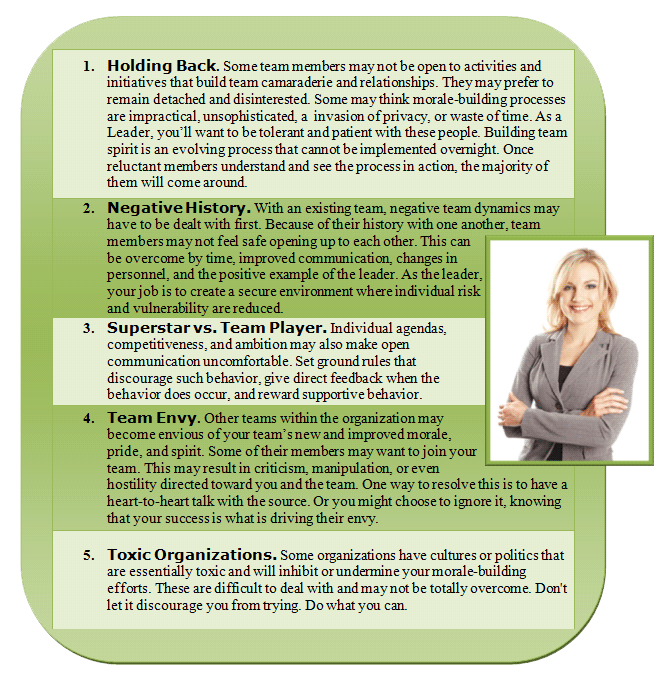

 Members must be able to work together as a unit.
Members must be able to work together as a unit.